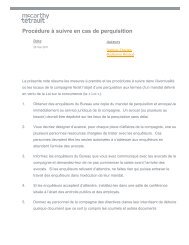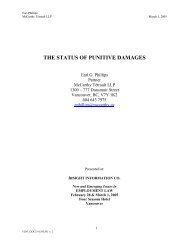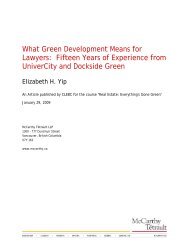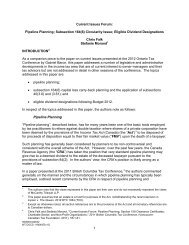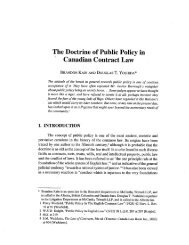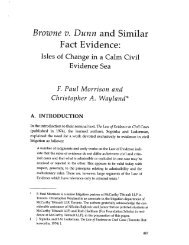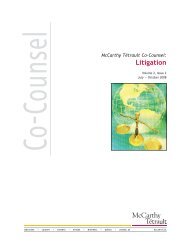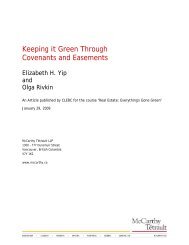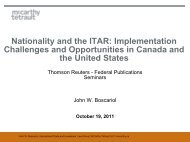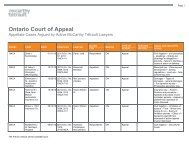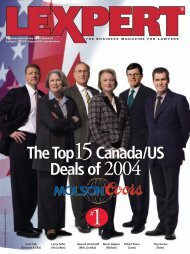1. COMPETITION - McCarthy Tétrault
1. COMPETITION - McCarthy Tétrault
1. COMPETITION - McCarthy Tétrault
You also want an ePaper? Increase the reach of your titles
YUMPU automatically turns print PDFs into web optimized ePapers that Google loves.
mentioned above, each of the parties should have entered into a<br />
legally binding agreement to act as a single unit in managing the<br />
matters of the applicant company.<br />
To prevent control by foreign companies and to ensure that the spirit of the<br />
uplinking norms is maintained the following requirements have also been<br />
brought in:<br />
DISCLOSURES<br />
At the time of filing of application, the applicant is required to make full<br />
disclosure of Shareholders Agreements, Loan Agreements, and such other<br />
Agreements that are finalized or proposed. Any subsequent changes<br />
having bearing on these agreements must be disclosed to the Ministry of<br />
Information and Broadcasting (the "I&B") within 15 days.<br />
The applicant is required to provide the names and details of (i) proposed<br />
directors who are not resident Indians, (ii) any foreigners/NRIs to be<br />
employed or engaged by the company as either consultants (or in any<br />
other capacity) for more than 60 days in a year, or as regular employees.<br />
Prior permission for alteration of shareholding pattern and agreements:<br />
Company must obtain prior permission from I&B before effecting any<br />
alteration in the foreign shareholding patterns and the shareholding of the<br />
largest Indian shareholders, or any alteration in any other Agreements.<br />
THOSE IN CONTROL SHOULD BE RESIDENT INDIANS<br />
At least 3/4th of the Directors of the company and all key Executives and<br />
Editorial staff, CEO of the applicant-company, and/ or head of the channel<br />
are required to be resident Indians.<br />
REPRESENTATION ON BOARD<br />
The representation on the Board of Directors of the company should as far<br />
as possible be proportionate to the shareholding.<br />
Applicant company to retain control:<br />
• all appointments of key personnel (executive and editorial) are to be<br />
made by the applicant company without any reference from any other<br />
company, Indian or foreign.<br />
• the applicant company should have complete management control,<br />
operational independence and control over its resources and assets<br />
and must have adequate financial strength for running a news and<br />
current affairs TV channel.<br />
These safeguards appear to have been considered, in the wake of a<br />
controversial uplinking application, by STAR News. STAR News and its<br />
group companies are facing allegations that a foreign company is using<br />
"shell companies" and "dummy investors" to exercise proxy editorial and<br />
financial control. STAR News, whose application is pending approval, has<br />
been given time until 28th September 2003 to comply with the new<br />
Guidelines. Currently, Star is negotiating with prospective local partners to<br />
finalize the dominant Indian partner as required by the new Guidelines and<br />
have sought an extension of the compliance deadline.<br />
The Government has also decided in principle to rework the print medium<br />
FDI norms, so as to bring them at par with the electronic medium,<br />
wherever necessary.<br />
For more information please contact: vaibhav@nishithdesai.com<br />
1<strong>1.</strong> PRIVACY<br />
ARGENTINA<br />
COURTS ADDRESS THE USE<br />
OF LABOR E-MAIL ACCOUNTS<br />
The Secretariat of Communications, relying upon its Executive Power, is<br />
currently working on a project bill identified as Legal Protection of E-mails<br />
(the "Project"). Section 3 of the Project establishes that:<br />
• e-mail accounts provided by an employer for an employee as a<br />
consequence of a labor relation shall be considered to be the<br />
employer's property, and<br />
• the employer shall have the right to access and control the information<br />
of such e-mail accounts, if the terms and conditions of use and access<br />
have been notified to the employee.<br />
Two labor courts recently addressed the issue of e-mail accounts provided<br />
by an employer for an employee, and ruled under the same line of<br />
reasoning as the Project. However, the courts arrived at different results<br />
due to the particular facts and evidence of each case.<br />
In the first case, Labor Court of Appeals 9 held that the termination of the<br />
labor relation of an employee who had used the labor e-mail account for<br />
personal benefits was not a reasonable cause to fire the employee. The<br />
court took into account the fact that the employer had not notified or<br />
communicated to the employee the terms and conditions of use and<br />
access of the labor e-mail, as suggested by the Project. Accordingly, the<br />
employee's use of the e-mail account for personal matters was not<br />
sufficient to warrant a termination of employment.<br />
On the other hand, in a separate case, a First District Labor Court held that<br />
reasonable use of labor e-mail did not include receiving and forwarding<br />
pornographic texts or images. Here, the Court affirmed that the employee<br />
had been advised on several occasions about the labor e-mail policies,<br />
which opposed the employee's conduct.<br />
In spite of the different results, both courts coincided on the need to notify<br />
or communicate labor e-mail policies to employees, while emphasizing the<br />
validity and enforceability of those policies, as well as the employer's right<br />
to control the e-mail accounts.<br />
For more information please contact: gonzaloz@mille.com.ar<br />
ITALY<br />
NEW CODE FOR PRIVACY PROTECTION<br />
On 30th June 2003, the Italian Council of Ministers finally approved a new<br />
personal data protection code (the "Code") that will take effect on 1st<br />
January 2004.<br />
The new text unifies fragmented provisions from amended and integrated<br />
Law 675/1996, the Italian framework on personal data protection, which<br />
introduced several innovations in line with the Personal Data Protection<br />
Authority case law ("Garante per la protezione dei dati personali"), and<br />
European Directive 2000/58, regarding privacy and the Internet. The body<br />
of rules maintains an opt-in regime. However, the notification system<br />
represents an important innovation. While the current regime requires<br />
every party that is not specifically exempted to provide notice to the<br />
Authority, the new Code reverses the approach by enumerating specific<br />
cases that will require notification. Further, the Code, in line with the<br />
European trend, reduces to thirty months the maximum conservation term<br />
ISSUE 22 SEPTEMBER – OCTOBER 2003 10



